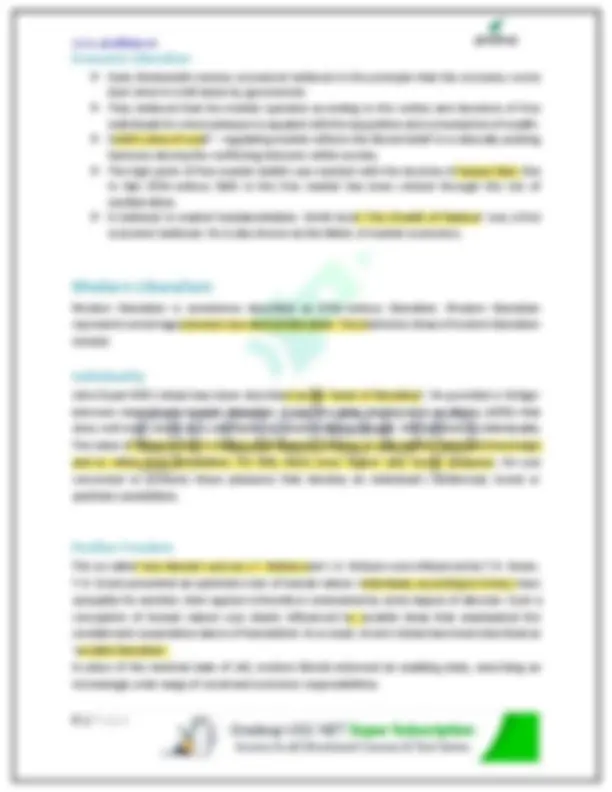





Study with the several resources on Docsity

Earn points by helping other students or get them with a premium plan


Prepare for your exams
Study with the several resources on Docsity

Earn points to download
Earn points by helping other students or get them with a premium plan
Community
Ask the community for help and clear up your study doubts
Discover the best universities in your country according to Docsity users
Free resources
Download our free guides on studying techniques, anxiety management strategies, and thesis advice from Docsity tutors
explains the ideas of liberalism
Typology: Study notes
1 / 7

This page cannot be seen from the preview
Don't miss anything!




➢ Liberalism is a system of political thought which put the interest or goals of individual before the interest of society as a whole or state. ➢ The word liber has various meanings. The Latin word liber referred to a class of free men. ➢ The term 'liberalism' denotes a political mobilization which insists on Liberty of individual as the first and foremost goal of Public Policy. ➢ The central theme of liberal ideology is to construct a society in which people can satisfy their interests and achieve fulfillment. ➢ Liberal societies are organized politically around the twin principles of constitutionalism and consent, designed to protect citizens from the danger of government tyranny. ➢ There are significant differences between classical liberalism and modern liberalism. Classical liberalism supports the 'minimal' state. Modern liberalism in contrast accepts that the state should help people to help themselves.
➢ Some thinkers like Paul Seabright argued liberalism can be traced back to earlier settled communities to find ways of trading and living with strangers. ➢ Nevertheless, liberalism as a developed ideology was a product of the breakdown of feudalism in Europe and the growth of a market or a capitalist society. ➢ Liberals challenged the absolute power of the monarchy, based on the doctrine of the 'divine rights' of king. ➢ 19th century was the century of liberals. As liberalization spread throughout western countries liberals advocated an industrialized and market economic order 'free' from government interference. ➢ Such system first developed in UK in mid-18th century and they spread to North America and throughout Europe. ➢ From 20th century onwards, industrial capitalism started making appeal to developing countries. ➢ The character of liberalism changed and moved toward modern liberalism as the 'rising middle classes' succeeded in establishing their economic and political dominance.
➢ Third, liberals subscribe to a belief in equality of opportunity. ➢ Liberals believe in 'meritocracy'. A meritocratic society is one in which inequalities of wealth and social position reflect the unequal distribution of talent among human beings which are based on factor beyond human control. ➢ Classical liberals have enclosed strict meritocracy. ➢ Modern liberals, on the other hand, have taken social justice to imply a belief in some measures of social equality. For example, in A Theory of Justice, John Rawls argued that economic inequality is only justifiable if it works to the benefit of the poorest in society.
➢ Liberalism celebrates moral, Cultural and Political diversity. ➢ This commitment to toleration, attributed to the French writer Voltaire , is memorably expressed in the declaration that, 'I detest what you say but will defend to the death your right to say it.
➢ Liberals believes that balanced and tolerant society can only be provided by a sovereign states Freedom can therefore only exist under the law as John Locke put it, where there is no law there is no freedom.' Therefore, we need a liberal state to safeguard our freedom from us. ➢ Liberals are convinced that government exercises sovereign power and so poses a constant threat to individual liberty. This was expressed in Lord Actions' famous warning. Power Tends to Corrupt, And Absolute Power Corrupts Absolutely.' ➢ Therefore, we need a constitution or a set of rules. The most important of these is a so- called written constitution. The first such document was the US constitution ➢ Second, constitutionalism can be established by the introduction of internal constraints which disperse political power among a number of institutions. This separation of power was proposed by Montesquieu as he puts it. Power should be a check to power.
It emerged during the early industrialization of the nineteenth century. Classical Liberalism draws on a variety of doctrines and theories. The most important of these are: ➢ Natural Rights ✓ The idea of natural or human rights has affected liberal thought in a number of ways. ✓ For example, Locks says the contract between state and citizen is a specific and limited one; its purpose is to protect a set of defined natural rights. ✓ As a result, Locke believed in limited government. Right. ✓ The legitimate role of government is limited to the protection of 'life liberty and property.'
➢ Early Nineteenth-century economist believed in the principle that the economy works best when it is left alone by government. ➢ They believed that the market operates according to the wishes and decisions of free individuals for whom pleasure is equated with the acquisition and consumption of wealth. ➢ Smith's idea of a self – regulating market reflects the liberal belief in a naturally existing harmony among the conflicting interests within society. ➢ The high point of free-market beliefs was reached with the doctrine of laissez-faire. But in late 20th-century faith in the free market has been revived through the rise of neoliberalism. ➢ It believed in market fundamentalism. Smith book 'The Wealth of Nations' was a first economic textbook. He is also known as the father of market economics. Modern Liberalism Modern liberalism is sometimes described as 20th-century liberalism. Modern liberalism represents a marriage between new and old liberalism. The distinctive ideas of modern liberalism include:
John Stuart Mill's ideas have been described as the 'heart of liberalism'. He provided a 'bridge' between classical and modern liberalism. It was the ideas developed in on liberty (1859) that show mill most clearly as a contributor to modern liberal thought. Mill believed in individuality The value of liberty is that it enables individuals to develop, to gain talents, skills and knowledge and to refine their sensibilities. For Mill, there were 'higher' and 'lower' pleasures. He was concerned to promote those pleasures that develop an individual's intellectual, moral or aesthetic sensibilities.
The so-called 'new liberals' such as L.T. Hobbes and J. A. Hobson were influenced by T.H. Green. T.H. Green presented an optimistic view of human nature. Individuals, according to Green, have sympathy for another, their egoism is therefore constrained by some degree of altruism. Such a conception of human nature was clearly influenced by socialist ideas that emphasized the sociable and cooperative nature of humankind. As a result, Green's ideas have been described as 'socialist liberalism'. In place of the minimal state of old, modern liberal endorsed an enabling state, exercising an increasingly wide range of social and economic responsibilities.